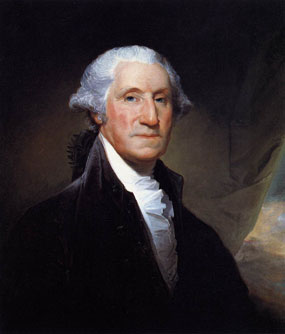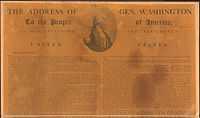George Washington
George Washington (Born::February 22, 1732 – Died::December 14, 1799) is best known as the first president of the United States. He was born in 1732 into a Virginia planter family, and later pursued two intertwined interests: military arts and western expansion. He was commissioned a lieutenant colonel in 1754, and fought the first skirmishes of what grew into the French and Indian War. When the Second Continental Congress assembled in Philadelphia in May 1775, Washington, one of the Virginia delegates, was elected Commander in Chief of the Continental Army. In 1781 with the aid of French allies--he forced the surrender of Cornwallis at Yorktown. He became a prime mover in the steps leading to the Constitutional Convention at Philadelphia in 1787. When the new Constitution was ratified, the Electoral College unanimously elected Washington President.[1]
He was also an Episcopal vestryman and a firm believers in the importance of religion for republican government. As a citizen of Virginia, he was sympathetic to general religious taxes being paid by the citizens of the states to the churches of their choice. However as a statesmen he would have discouraged such a measure at the national level because of its divisiveness. He instead confined himself to promoting religion rhetorically, offering frequent testimonials to its importance in building the moral character of American citizens, that, he believed, undergirded public order and successful popular government.[2]
Farewell Address
In George Washington's Farewell Address of September 1796, the president advised his fellow citizens that "Religion and morality" were the "great Pillars of human happiness, these firmest props of the duties of Men and citizens". "National morality", he added, could not exist "in exclusion of religious principle". "Virtue or morality", he concluded, as the products of religion, were "a necessary spring of popular government". [3]
The document is perhaps one of the most important in American history. Recommendations made in it by the first president, particularly in the field of foreign affairs, have exerted a strong and continuing influence on American statesmen and politicians. The address, in which Washington informed the American people that he would not seek a third term and offered advice on the country's future policies, was published on September 19, 1796, in David Claypoole's American Daily Advertiser. It was immediately reprinted in newspapers and as a pamphlet throughout the United States. The address was drafted in July 1796 by Alexander Hamilton and revised for publication by the president himself. Washington also had at his disposal an earlier draft by James Madison.[4]
The "religion section" of the address was for many years as familiar to Americans as was Washington's warning that the United States should avoid entangling alliances with foreign nations. Washington's observations on the relation of religion to government were commonplace, and similar statements abound in documents from the founding period. Washington's prestige, however, gave his views a special authority with his fellow citizens and caused them to be repeated in political discourse well into the nineteenth century.[5]
References
- Religion and the Federal Government: Religion and the Founding of the American Republic. by the U.S. Library of Congress
- Biography of George Washington by the White House.


